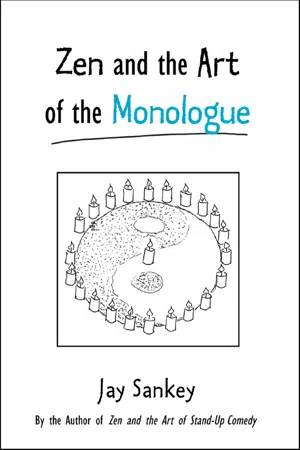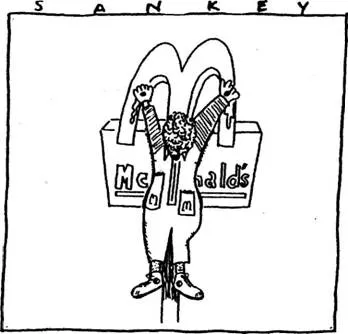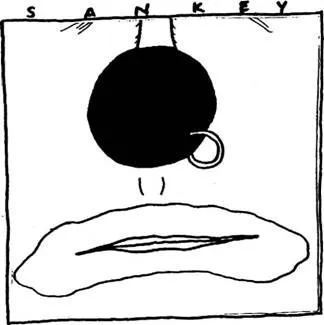
This is a test
- 160 pages
- English
- ePUB (mobile friendly)
- Available on iOS & Android
eBook - ePub
Zen and the Art of the Monologue
Book details
Book preview
Table of contents
Citations
About This Book
Jay Sankey--stand-up comic, magician, and cartoonist--is back with another book for performers. Building on the success of his Zen and the Art of Stand-up Comedy, Jay is moving further into the uncharted wilds of solo performance.
Frequently asked questions
At the moment all of our mobile-responsive ePub books are available to download via the app. Most of our PDFs are also available to download and we're working on making the final remaining ones downloadable now. Learn more here.
Both plans give you full access to the library and all of Perlego’s features. The only differences are the price and subscription period: With the annual plan you’ll save around 30% compared to 12 months on the monthly plan.
We are an online textbook subscription service, where you can get access to an entire online library for less than the price of a single book per month. With over 1 million books across 1000+ topics, we’ve got you covered! Learn more here.
Look out for the read-aloud symbol on your next book to see if you can listen to it. The read-aloud tool reads text aloud for you, highlighting the text as it is being read. You can pause it, speed it up and slow it down. Learn more here.
Yes, you can access Zen and the Art of the Monologue by Jay Sankey in PDF and/or ePUB format, as well as other popular books in Media & Performing Arts & Performing Arts. We have over one million books available in our catalogue for you to explore.
Information
1
The Monologue
What is a monologue?
Words have the power to destroy or heal. When words are both true and kind, they can change our world.
—Shunryu Suzuki
A monologue is a predominantly verbal presentation given by a single person featuring a collection of ideas, often loosely assembled around one or more themes. Note that I do not define it as a strictly verbal presentation; many, though certainly not all, successful monologuists also employ nonverbal elements to great effect, such as, their use of facial expressions and hand gestures, along with a variety of props and stage devices.
Is it okay to have a friend perform my monologue with me?
No, it’s not okay. In fact, it’s very wrong. It’s a monologue, coming from the Greek word mono, which means “singular,” “one,” “alone.” Just you. No friends. No family. No supporting actors. No highly publicized cameos. You are alone onstage: accept it.
How does a monologue differ from a play?
Zen insists on personal experience and insight.
—Irmgard Schloegl
Both a play and a monologue have a script, a performance, and (on a good night) an audience . But while a play usually features several performers, a monologue has but one. A play, with its usual cast of several performers, has much more with which to appeal to not only the audience’s eyes but their minds and hearts as well. Several actors make group dynamics possible and provide a much greater variety of physical actions onstage. This in turn gives many more possibilities for an engaging narrative.
As a monologuist, you have none of this. From one moment to the next the audience’s attention remains solely yours. But what incredible freedom! This combination of intense attention and personal freedom is in fact one of the most powerful attractions to the monologue form.
Of course, such freedom also represents a very real danger, especially to the vain or inexperienced, as it offers more than enough rope for the impetuous to hang themselves. Monologues also tend to explore a single event or theme from various intellectual and emotional vantage points, rather than, like plays, telling a long and complicated story. In most monologues, not a lot actually “happens.” Again, this is probably because action is not one of the natural strengths of the form. Nevertheless, an hour of mere “telling” can get excruciatingly dull for performers and audiences alike, which is why really effective monologues tend to explore and examine the most intimate contents of a human soul. In response to the intensity of an entire audience’s silent, respectful, even expectant focus, the monologuist works to share his or her most personal thoughts with equal intensity.
What is the difference between a monologue, a soliloquy, and a speech?
The script is the actor’s greatest enemy.
—Sanford Meisner
One of the most obvious differences is their typical length. Speeches and soliloquies are often only five, ten, or maybe at most fifteen minutes long, while monologues are commonly forty, sixty, even ninety minutes in length. This is precisely why they are sometimes referred to as “one-person shows.”

Ronald of Nazareth
But even more significantly, when someone gives a speech, there is not only a definite “prewritten” feel to it, but also often a sense that the speaker (who is seldom truly “performing”) believes he or she knows something. Speeches are usually more about ideas than feelings. And while a soliloquy can be an extremely emotional experience for both the performer and the audience, soliloquies too still tend to feel scripted. All too often actors performing soliloquies seem more focused on respecting the carefully worded texts they hold fervently in their minds than on truly communing with the breathing audience seated in front of them.
To my mind, the very spirit of the monologue form is based on the audience’s intense involvement, with the goal being a sharing more than a “delivering” or “telling.” And it is this emphasis upon profound sharing that colors much of my thinking about the craft of the monologue.
On both sides of the footlights, monologues simply have a different feel. With the performer striving to cultivate a powerful sense of intimacy with the audience, the best monologues seem more like a chatty, stream-of- consciousness confessional than a prepared speech or even a moving soliloquy. And by “intimacy” I mean a powerful sense of connection resulting from a heightened awareness of a shared reality. In fact, monologuists typically try to establish a “sitting across the table in a coffee shop” rapport with their audience, so they are not so much “the performer” as an extremely articulate and impassioned confidante on a roll. Consequently, monologuists commonly break from their scripts, going off on a totally unprepared tangent before returning to their carefully written scripts. The form simply has a sublimely unfettered, trusting, and even freewheeling sensibility.
DO SIAMESE TWINS REALLY UNDERSTAND DOUBLE ENTENDRES?
Yes and no. They understand them on an intellectual level, but seldom find them engaging or amusing on an emotional level. After years of intensive studying and research I have concluded (I believe definitively) that this is because the twins, connected at the hip as they are, sense that double entendres subtly echo their own peculiar physical circumstance, and so find them vaguely unsettling. Consequently, if you ever spot one or more Siamese twins in the crowd during a performance, I advise you to stick to puns and knockknock jokes. Twins, connected or not, love a good knock-knock joke; each of them intuitively feels capable of either relating to or identifying with one of the two “knocks.”
What is the difference between a stand-up comedy set and a monologue?
While a stand-up comedy set tends to be primarily cathartic, I believe a monologue typically explores a greater intellectual and emotional range. Monologues are also generally more interested in actual events and powerful feelings, though there are certainly comics who specialize in the telling of true stories. Bill Cosby and Lenny Bruce were masters of this kind of stand-up.
And again, the implicit relationship between the performer and the audience is very different during a comedy show in a club than it is during a monologue in a theater. In a comedy club, the crowd comes to laugh. No less, and very little more. And undoubtedly, the intensity of these two simple desires, to laugh (the audience) and to make them laugh (the performer), makes for a powerful experience. But I am not convinced stand-up comedy has a monologue’s potential for a true transformation of both the audience members and the performer.
Audience expectation also profoundly influences the total experience. Did they come to laugh or come to learn? To drink or to explore? To watch or to participate? All of these distinctions account for many of the differences between stand-up comedy and monologuing.
What makes the monologue form so special?
I am not going to show you my art. I am going to share it with you. If I show it to you it becomes an exhibition, and in time it will be pushed so far into the back of your mind that it will be lost. But by sharing it with you, you will not only retain it forever, but I too will improve.
—Ed Parker, karate master
I sometimes think of a monologue as a kind of “talking cure.” Not just for the performer, but for the audience too. One person sharing a collection of some of her most intimate musings and speculations within an artfully established and purposefully thematic context can be a fascinating catalyst for all kinds of sharing, between the performer and the audience, and among the audience members themselves, both during and after the performance. Ultimately, a monologue is a means of revelation. Truths are revealed, both familiar and foreign, and in a manner as simple and straightforward as it is courageous. One person stands up in front of a group of strangers, and in the process the souls of all present are unearthed and illuminated. Truly, a wonderful thing.
What is the result of this kind of profound theatrical sharing?
The urge to transcend self-conscious selfhood is a principal appetite of the soul.
—Aldous Huxley
Powerful theatrical experiences yield a transformation of both the audience and the performer, a slight breaking down of at least a few of the subtle distinctions that existed before this sharing. Many of us, especially in Western culture, walk around with tragically fixed ideas of “I am this” and “they are that.” Yet humans are much more alike than not and share so much more in common than our egos often would like to admit. Many of our givens about how different we all are only serve to separate and divide us from the truth of our one, shared state.
But through artistic encounters like the monologue, even as we witness the expression of this or that unique perspective, we at the same time experience a profound underlying similarity. A sharedness. And it is this, above all else, that I believe is the most valuable outcome of the performance of any monologue.
DO DYSLEXICS READ BOOKS FROM THE BACK TO THE FRONT?
No, that’s just silly. But I often have wondered what it must be like to sometimes see a word backward. To be driving down the road, let’s say on your way to a restaurant, and to look up at a stop sign and see the word pots. Then at the restaurant to be handed a desserts menu and see the word stressed. And even on your way out of the restaurant, when you’re paying your bill at the cash register, to look down at the bowl marked TIPS and wonder why they want you to spit on all those coins. And finally, assuming it was an especially spicy meal, to have someone offer you a Tums, only to see the word smut. Must be weird. In fact, perhaps out of respect for this unusual visual malady, we should always spell the word cixelsyd. Just a thought.
Why should I write and perform a monologue?
The more fully we give our energy, the more it returns to us.
—Master Rinzai
Because it’s a challenge, because it’s fun—for a million reasons! Monologues offer a variety of writing and performing opportunities unlike any other theatrical form. You and your audience share a wonderful intimacy and an unusual degree of focused attention, resulting in an incomparable opportunity for an exchange of perspectives. You share yours directly through your script and performance, and they share theirs with you indirectly through their response. Seldom do both performers and audience have the opportunity to drink so deeply of each other’s vision.
Monologuing is an extremely pliant form, especially given the expectations of many monologue audiences. I certainly wouldn’t say their expectations are low, but they are seldom restrictive. Monologue audiences realize that they usually are in store for a performance without a typically linear narrative or cast of characters. They do however expect (hope?) that the performer will nonetheless take them on a fascinating and perhaps even thrilling ride.
Along with these forgiving audience expectations, the form itself encourages the performer to jump freely from one subject or theme to another, and so a monologue is also the ideal way to both explore and showcase your abilities as a performer, writer, art director, musician, and so on. And to think that you can perform a monologue anytime and anywhere! It is without a doubt one of the most direct and intense means of “birthing” your unique creative perspective—the way you and only you experience and see the world. And in sharing this perspective with others, you will in turn gain a sublime confidence in yourself as a performer, as a writer, and perhaps best of all, as a human being with a valid outlook on this thing we call life!

Hip Clown
IS IT A GOOD IDEA TO WRITE A SMALL PART IN MY SHOW FOR MY PET DOG, CAT, OR BUDGIE?
It really depends. Can your pet, as cute as it may well be, be trusted to act professionally at all times? Is your pet union or nonunion? Is it good with accents? What about its comedic timing? These are all extremely important questions. And even if after careful consideration you decide to write your pet into the script, I suggest you give your pet very few lines, and even these should not be essential. I remember once watching a Scandinavian woman perform a two-hour monologue with a live, chittering otter tied to her back. It was terrible theater, but I can’t say I’ll ever forget it.
What exactly is Zen?
When you seek it, you cannot find it.
—Traditional Zen koan
Actually, nothing about Zen is exact. Zen is the Japanese word for meditation. Zen is also a school of Buddhism (strongly influenced by Taoism) that was developed in China during the sixth century A.D. The Buddha taught that we are each an integral part of a single, unified reality—that all is one. The Buddha also taught that our ego or “self” tends to delude us into both thinking and feeling that we are somehow separate from the world and other people. This tendency, the Buddha said, is in turn the cause for all of life’s sufferings. Many of the cultures of the world are based on a variety of beliefs and practices that actually nurture this sense of separation rather than combat it. But through Zen, we are awakened from this “cultural trance,” our self is silenced, and we are returned, if only for a few moments, to our original state of grace.
Sometimes one of the best ways to try to describe something, especially something open to a great many misunderstandings, is to take a few moments to state what it is not. Zen is not a religion. Zen is not ritualistic. And though it is said to have both “masters” and “students,” when it comes to Zen there is nothing to teach and nothing to learn. In this way, Zen defies analysis. Its goal is experience, not understanding, the connection between things rather than the things themselves.
What does Zen have to do with monologuing?
Zen is simply a voice crying, “ Wake up! Wake up!”
—Maha Sthavira Sangharashita
To my mind, both Zen and monologuing share many of the same goals and even reflect a similar spirit. Both are passionately interested in the cultivation of personal expression and the exploring of a larger, unified reality. Monologuing also presents a wonderful variety of challenges to our fragile hearts and troubled minds, and adop...
Table of contents
- Cover Page
- Title Page
- Copyright Page
- Foreword
- 1: The Monologue
- 2: The Script
- 3: The Promotion
- 4: The Stage
- 5: The Rehearsal
- 6: The Audience
- 7: The Performance
- 8: The Television Production
- Interview with Paul McConvey
- A Sitting Meditation
- Fringe Festivals
- Selected Bibliography and Videography